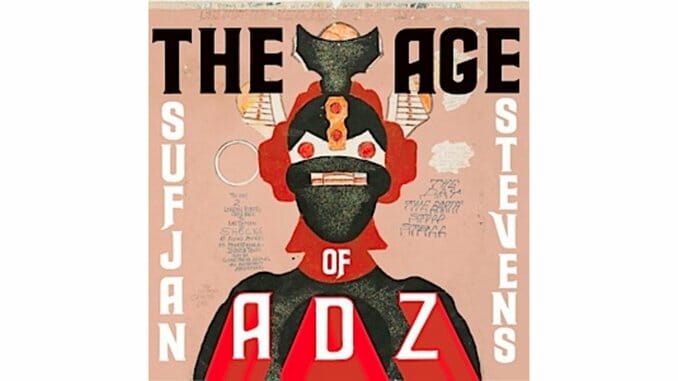Sufjan Stevens – The Age of Adz

Most people would call The Age of Adz Sufjan Stevens’ first proper album since 2005, when the much-lauded Illinois made him a household name—at least in recently gentrified neighborhoods. While his new legion of fans (including myself) eagerly anticipated odes to our respective states that were as gut-wrenching as they were exhaustively researched, Stevens instead gave us a Christmas series, a symphonic suite and the surprisingly abundant overflow of Illinois-themed songs.
He seemed to be fleeing from the spotlight, willfully sabotaging the momentum built with a trio of records, Michigan, Seven Swans and Illinois that were tied together by an orchestral-folk style—a sound that only occasionally peeks through on the much noisier Age of Adz. But looking back further, those three album represent an unusual consistency in a career marked with experimentation, progression and, well, noise.
Stevens started out playing folk-rock in his college band, Marzuki, and the first strains of his solo album A Sun Came! play like the soundtrack to a Renaissance Fair. But even then he was playing with vocal effects, adding an unusual spectrum of instruments and interspersing cacophonic jam sessions like “Rice Pudding” and ridiculous interludes years before Kanye West. And he followed that album with Enjoy Your Rabbit, 14 tracks of noisy electronica that make the most industrial moments on Age of Adz seem downright melodic.
So his pursuit of side projects might have had nothing to do with a response to all the attention. Those projects likely just interested him more than the traditional collection of songs we’ve been pining for. He said in an interview with Paste last year that his work on The BQE for the Brooklyn Academy of Music blew up his idea of a “song” to the point where three- to five-minute verse-chorus-verse structures no longer made sense. “In all honesty, that piece is what really sabotaged my creative momentum,” he said. “It wasn’t Illinois so much. I suffered sort of an existential creative crisis after that piece. I no longer knew what a song was and how to write an album. It overextended me in a way that I couldn’t find my way back to the song.”
-

-

-

-

-

-

-

-

-

-

-

-

-

-

-

-

-

-

-

-

-

-

-

-

-

-

-

-

-

-

-

-

-

-

-

-

-

-

-

-








































